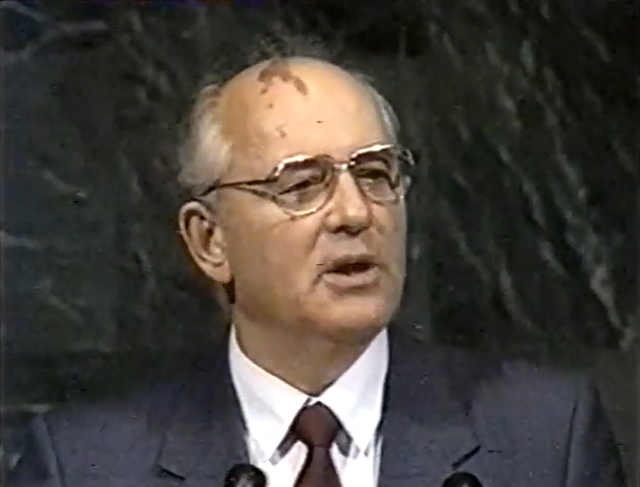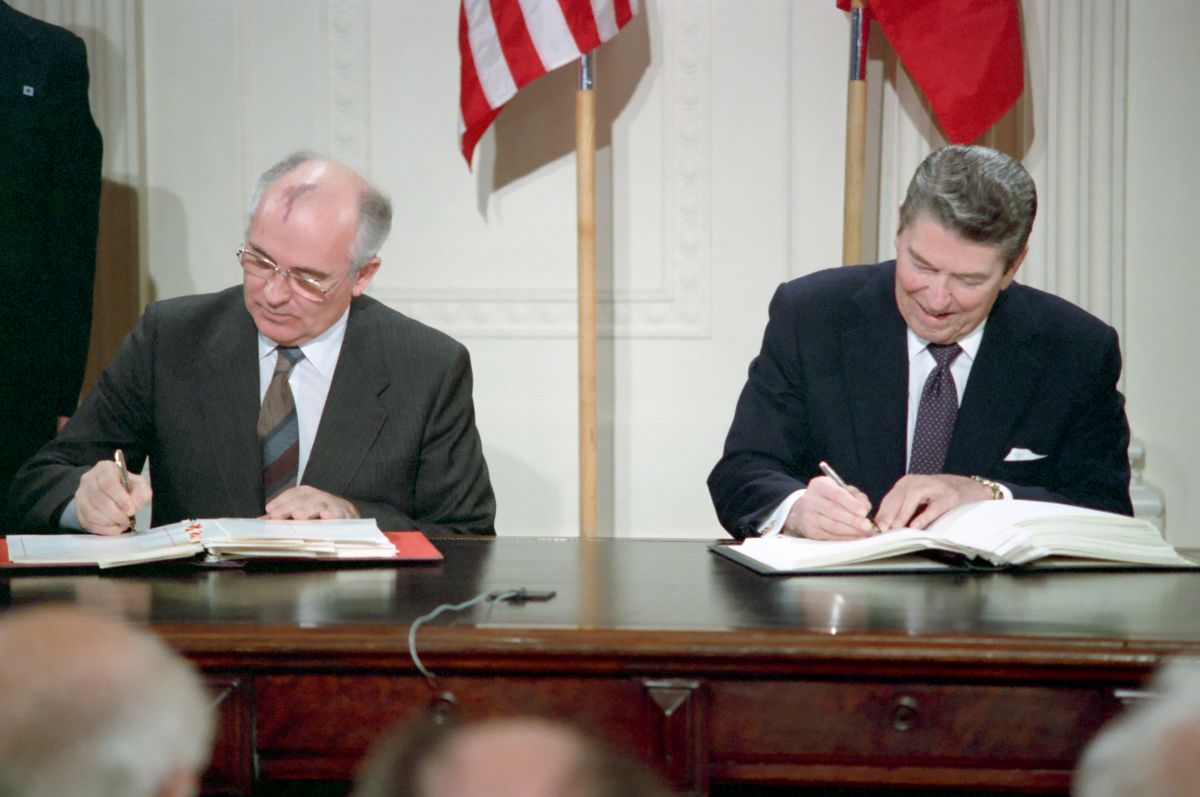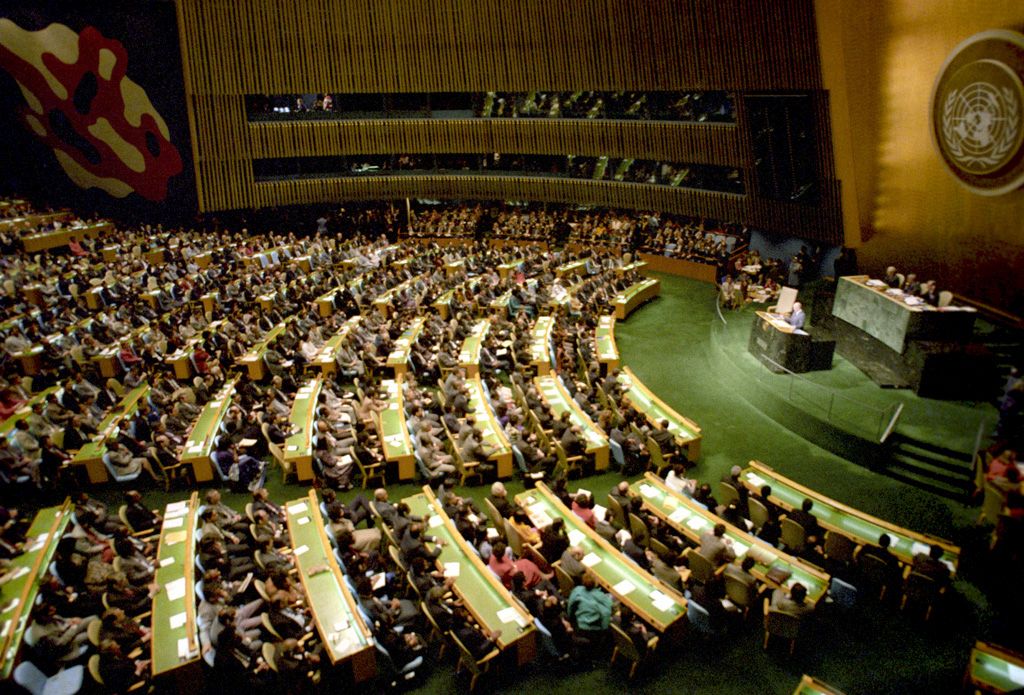Vera and Donald Blinken Open Society Archives
“Toward a World Without Weapons and Violence” – Mikhail Gorbachev Died 1 Year Ago
 A year ago today, on August 30, 2022, Mikhail Gorbachev, final leader of the Soviet Union between 1985 and 1991, died in a Moscow hospital at the age of 91. Named Man of the Decade by the Time Magazine in 1990, Gorbachev was and remains to be highly popular in the West for restructuring the USSR’s political and economic system (perestroika) and the liberal reforms that touched previously prohibited topics about the country’s silenced past ( glasnost’). At home in Russia, however, opinions about him and his legacy are divided. While historians still debate whether the Soviet economy was capable of sustaining the liberal reforms, introduced by Gorbachev, without collapsing, and conservative-minded politicians gain votes for emphasizing the former leader’s alleged mistakes in governing, the general public, a large part of which is drawn by the nostalgia for the USSR, has heavy feelings and negative opinion about the former Soviet leader. What often stays in the shadow of these debates is Gorbachev’s contribution to building bridges between the East and the West at the end of the Cold War in terms of efforts strengthening trust.
A year ago today, on August 30, 2022, Mikhail Gorbachev, final leader of the Soviet Union between 1985 and 1991, died in a Moscow hospital at the age of 91. Named Man of the Decade by the Time Magazine in 1990, Gorbachev was and remains to be highly popular in the West for restructuring the USSR’s political and economic system (perestroika) and the liberal reforms that touched previously prohibited topics about the country’s silenced past ( glasnost’). At home in Russia, however, opinions about him and his legacy are divided. While historians still debate whether the Soviet economy was capable of sustaining the liberal reforms, introduced by Gorbachev, without collapsing, and conservative-minded politicians gain votes for emphasizing the former leader’s alleged mistakes in governing, the general public, a large part of which is drawn by the nostalgia for the USSR, has heavy feelings and negative opinion about the former Soviet leader. What often stays in the shadow of these debates is Gorbachev’s contribution to building bridges between the East and the West at the end of the Cold War in terms of efforts strengthening trust.
One of the hottest and most problematic areas that Mikhail Gorbachev strived to reduce tension about was the nuclear field. Having faced heavy criticism for the 1986 Chernobyl accident and its disastrous management, he invested effort into bringing forward the agenda on nuclear disarmament—both at home and in the international arena. Commemorating the first anniversary of his death, we publish segments from three of Gorbachev’s public addresses from the late 1980s, in which he speaks out against not only nuclear weapons, but “the use or threat of force” as “an instrument of foreign policy” in general, promoting “a world without weapons and violence.”
 President Ronald Reagan and Soviet General Secretary Mikhail Gorbachev signing the INF Treaty
President Ronald Reagan and Soviet General Secretary Mikhail Gorbachev signing the INF Treaty
in the White House on December 8, 1987.
(Photo: Wikimedia Commons)
A milestone in reducing the number of nuclear weapons on the continent was the 1987 Intermediate-Range Nuclear Forces Treaty (INF Treaty) signed by Russian and US Presidents Mikhail Gorbachev and Ronald Reagan. The INF Treaty was an arms-control treaty between the two camps that had been competing in the Cold War. The treaty fully banned US and Soviet land-based ballistic missiles, cruise missiles, as well as short medium- and intermediate-range launchers. An unprecedented breakthrough in terms of international security after decades of mistrust, the INF Treaty was considered a first step toward a nuclear-free world. The elimination of nuclear weapons was televised, and the idea of nuclear weapons being a threat to entire humanity, regardless of camps, was broadly advertised.
For Gorbachev, signing the INF Treaty was a landmark of his foreign politics. Already prior to it, he frequently voiced the idea that achieving a nuclear-weapons-free world is essential for the survival of humankind. Several of such speeches were broadcast on state television, and are thus available at the Blinken OSA Archivum, among the 800 hours of Soviet and Russian Television Monitoring recorded by Radio Free Europe/Radio Liberty Research Institute.
In February 1987, the Kremlin housed an international conference under the title A Nonnuclear World for the Survival of Mankind, which was also attended by Nobel Peace Prize laureate Andrei Sakharov, attracting world-wide attention. In his address, Gorbachev warned that the “militarization of thinking and way of life” would fuel military escalation and nuclear suicide. “Attempts to continue to solve the problems of a radically changed world by force, by methods inherited from the Stone Age, make a political catastrophe very likely.”
Excerpt from Mkhail Gorbachev's speech at the International Forum on a Nonnuclear World for the Survival of Mankind
in 1987 in Moscow. The full recording is available here.
(HU OSA 300-81-9 Records of RFE/RL Research Institute, Video Recordings of Soviet and Russian Television Programs)
Another occasion preceding the INF Treaty was, in May 1987, the Soviet–Romanian friendship meeting in Bucharest. Here, Gorbachev emphasized his commitment to “moving toward a world without weapons and violence.” He publicly announced launching a political program that targeted the reduction of nuclear weapons in the USSR, and the termination of nuclear tests.
Excerpt from Mikhail Gorbachev's speech at the Soviet-Romanian Friendship Meeting in 1987 in Bucharest.
The full recording is available here.
(HU OSA 300-81-9 Records of RFE/RL Research Institute, Video Recordings of Soviet and Russian Television Programs)
However, the true highlight was Gorbachev’s address at the UN General Assembly Session in December 1988, in New York. In this speech, also broadcast on Soviet TV, the leader laid out his vision of the future as one that required no wars or conflicts, noting that, “the movement toward a nuclear-weapon-free and nonviolent world is capable of radically transforming the political and intellectual identity of our planet.” He also defied the use of force as an ultimate guiding principle in international relations, urging superpowers to “exercise self-restraint and totally rule out any outward-oriented use of force.” Instead, Gorbachev vouched for establishing trust, and reaffirmed the USSR’s readiness to reduce its military contingent and weapons in Eastern Europe.
Excerpt from Mikhail Gorbachev's speech at the United Nations General Assembly in 1988 in New York.
The full recording is available here.
(HU OSA 300-81-9 Records of RFE/RL Research Institute, Video Recordings of Soviet and Russian Television Programs)
By 1991, as a result of the INF Treaty , the USSR and the US had eliminated 2,692 missiles, and 10 years of on-site verification inspections followed. The collapse of the USSR the same year set off diverse developments all over the region. Despite good intentions, it has proven to be increasingly difficult to decide on the fate of nuclear weapons on the territory of the former Soviet, now sovereign republics. In these newly independent states, on top of it, waves of protests demanded legal action against the former authorities for their role in the aftermath of the 1986 Chernobyl accident. Victims gained a new voice, a stronger one this time, as it was much easier to create grassroots organizations and publicly call the former Soviet authorities to account after 1991. The battle for compensation continued.
As for the 1987 Intermediate-Range Nuclear Forces Treaty, hopes for a safe world with no nuclear weapons have sunk into oblivion in 2019, after both parties formally suspended the treaty first, and then withdrew from it. A step back to the 1980s; Gorbachev’s achievements in nuclear disarmament lived relatively short. Yet, the politicians that came right after him, including Russia’s first president Boris Yeltsin, did continue on the path Gorbachev took, evident in the series of international treaties that were supposed to ensure the progress toward a world without nuclear weapons. One such agreement was the Budapest Memorandum of December 5, 1994, revolved around Ukraine’s nuclear disarmament, which we explored in detail. The outcomes of these treaties remain ambiguous and controversial, especially if seen from the present-day vantage point of the ongoing war that Russia launched against Ukraine.
 Mikhail Gorbachev addressing the UN General Assembly in New York, on December 8, 1988.
Mikhail Gorbachev addressing the UN General Assembly in New York, on December 8, 1988.
(Photo: Wikimedia Commons)
In a 2023 summer blockbuster biopic about the “father of the atomic bomb,” physicist Julius Robert Oppenheimer, the main character comes to realize that the nuclear weapon of mass destruction requires too high of a price in human lives. For Oppenheimer, eventually, arguments for scientific advancement or for military superiority in a war could not have fully justified the hundreds of thousands of deaths after the 1945 atomic bombings of Hiroshima and Nagasaki in Japan. This pacifist message closely resembles the beliefs and sentiments that Gorbachev shared. In the highly interconnected and global reality of today, it remains to be a question whether nuclear energy and the benefits of its use justify the potential risks that may affect the entire planet. For Gorbachev, the answer was self-evident.

